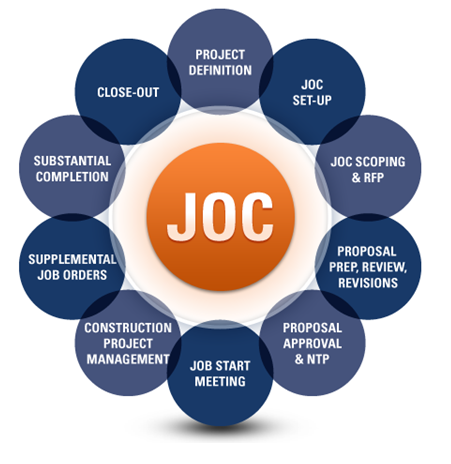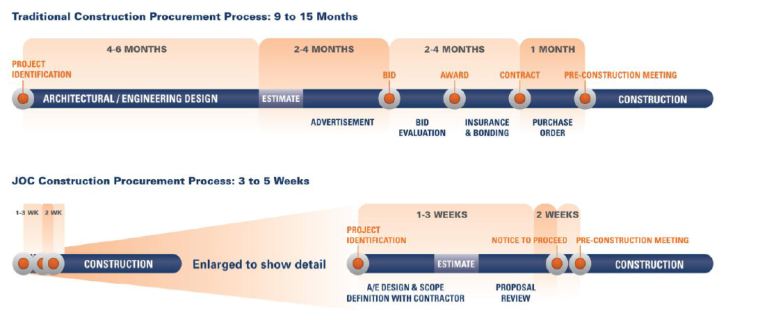Smaller renovation, repair, and sustainability projects represent significant challenges to many Owners, Contractors, and AEs. These projects need to be completed quickly, yet also require knowledge of local conditions and specialized needs. While design-build (DB) has achieved a degree of success for larger projects vs. traditional design-bid-build (DBB), DB requires a three to six month procurement process. Thus, while DB, and its even more collaborative counterpart integrated project delivery (IPD) make sense for larger capital projects, smaller projects typically need to be more responsive.
In the public sector (also now expanding to the private sector) the concept of Indefinite Delivery Indefinite Quantity (IDIQ) procurement addresses the need for these numerous smaller projects. Under the IDIQ contract type, work is delivered under multiple task orders, and the specific project needs are undefined at contract acquisition. To be transparent, productive, and cost efficient however, IDIQ’s require robust and structured implementation supported by technology. Certain skills sets are required of the Owners, Contractors, and AEs. Failure in addressing these issues with respect to IDIQ implementation simply results in a faster procurement mechanism WITHOUT any of the associated additional benefit, “checks and balances”, and transparency that should be associated with IDIQs.
MACCs and MATOCs – The most common and straightforward of IDIQs are Multiple Award Construction Contracts (MACCs) and Multiple Award Task Order Contracts (MATOCs). The advantage of these contract mechanisms is a smaller pool of pre-selected, qualified contractors that compete for individual task orders. Additional benefits include a streamlined selection/procurement process, and a group of constrictors with local knowledge of buildings and site conditions.
JOCs and SABERs- Job Order Contracting (JOC), also referred to a SABER in the United States Air Force, is another form of IDIQ. It is also referred to as “IPD-lite.” Job Order Contracting is another long-term (3-5 year) contract wherein projects are estimated by Owners and Contractors/AE using a Unit Price Book (UPB), for example the RSMeans Facility Cost Book. Contractors bid using the UPB and applying a coefficient the overall derived unit line cost estimate.
Job Order Contracting shortens the design and procurement timelines through a process well suited for smaller projects. The business process is illustrated below, as well as associated time savings.
JOC and SABER are performed-based construction delivery methods. Additional work is awarded to Contractors based upon successful project completion.
While JOC is not appropriate for all projects, is has been proven over the past few decades to be an extremely effective tool. JOC task orders are typically under $1 million, but total contract volume over the 3-5 year contact term can exceed $300 million.
Here’s a list of important considerations when starting up and managing a successful JOC program.
1. Internal estimates created by the Owner and/or Owners Representative
2. Joint Owner/Contractor site visits, and collaborative project scope development.
3. A well-established unit line time price book based upon national standards, and including as specialized local and/or owner-specific requirements.
4. Mutual trust and respect among contract participants, and some form of shared risk-reward.
5. Technology/software that embeds the JOC process to assure low cost and consistent deployment as well as ongoing project monitoring and updating. The largest number of JOC projects is executed by the Air Force, where the contracts go under the moniker SABER, or Simplified Acquisition of Base Engineering Requirements. The Air Force and other federal owners are leveraging JOC by using advanced software technologies such as project Estimator by 4Clicks Solutions and JOCWorks by RSMeans to embed JOC processes, including independent cost estimating, automatic technical evaluations, auto-population of government-mandated paperwork, and collaborative processes.
As the federal government faces fiscal constraints, the retirement of 50% of its acquisition personnel in the next seven years, and the need to address an aging portfolio of buildings and infrastructure, the use of IDIQ/JOC/SABER/MACC/MATOC contracts will significantly increase. Private sector organizations, and quasi-public agencies in healthcare, transportation, and other markets sector are also beginning to participate in the efficient, collaborative construction delivery methods.



